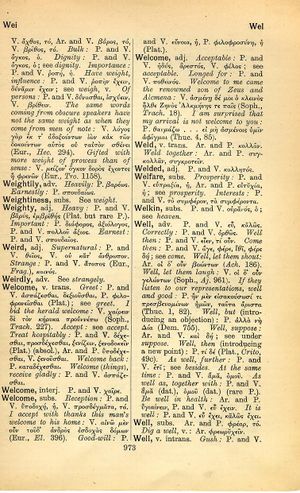well: Difference between revisions
m (Text replacement - "<b class="b2">Crito, 4</b>" to "''Crito'', 4") |
mNo edit summary |
||
| Line 4: | Line 4: | ||
P. and V. [[εὖ]], [[καλῶς]]. | P. and V. [[εὖ]], [[καλῶς]]. | ||
[[correctly]]: P. and V. [[ὀρθῶς]]. | |||
[[well then]]: P. and V. [[εἶεν]], τί [[οὖν]]. | |||
[[come then]]: P. and V. [[ἄγε]], [[φέρε]], [[ἴθι]], [[φέρε δή]]; see [[come]]. | |||
[[well, let them shout]]: Ar. οἱ δʼ οὖν βοώντων (''Ach.'' 186). | |||
[[well, let them laugh]]: V. οἱ δʼ οὖν γελώντων (Soph., ''Aj.'' 961). | |||
[[if they listen to our representations, well and good]]: P. ἢν μὲν εἰσακούσωσί τι πρεσβευομένων ἡμῶν, [[ταῦτα]] ἄριστα (Thuc. 1, 82). | |||
[[well]], [[but]] ([[introducing an objection]]): P. ἀλλὰ νὴ Δία (Dem. 755). | |||
[[well]], [[suppose]]: Ar. and V. καὶ δή; see under [[suppose]]. | |||
[[well]], [[then]] ([[introducing a new point]]): P. τί δέ (Plat., ''Crito'', 49C). | |||
[[as well, further]]: P. and V. [[ἔτι]]; see [[besides]]. | |||
[[at the same time]]: P. and V. [[ἅμα]], [[ὁμοῦ]]. | |||
[[as well as, together with]]: P. and V. [[ἅμα]] (dat.), [[ὁμοῦ]] (dat.) (rare P.). | |||
[[be well in health]]: Ar. and P. [[ὑγιαίνω|ὑγιαίνειν]], P. and V. [[εὖ ἔχειν]]. | |||
[[it is well]]: P. and V. [[εὖ ἔχει]], [[καλῶς ἔχει]]. | |||
'''subs.''' | '''subs.''' | ||
| Line 36: | Line 36: | ||
Ar. and P. [[φρέαρ]], τό. | Ar. and P. [[φρέαρ]], τό. | ||
[[dig a well]], v.: Ar. φρεωρυχεῖν. | |||
'''v. intrans.''' | '''v. intrans.''' | ||
[[gush]]: P. and V. ῥεῖν, ἀπορρεῖν, στάζειν (Plat. but rare P.), V. κηκίειν, ἐκπηδᾶν. | |||
[[of tears]]: P. and V. λείβεσθαι (Plat.). | |||
[[tears well from my eyes]]: V. ἐκ δʼ ὀμμάτων πηγαὶ κατερρώγασι (Eur., ''Alc.'' 1067). | |||
[[welling tears]]: V. χλωρὰ δάκρυα (Eur., ''Med.'' 922). | |||
[[a welling spring of water]]: V. [[δροσώδης]] ὕδατος νοτίς (Eur., ''Bacch.'' 705). | |||
}} | }} | ||
Revision as of 21:03, 21 August 2019
English > Greek (Woodhouse)
adv.
well then: P. and V. εἶεν, τί οὖν.
come then: P. and V. ἄγε, φέρε, ἴθι, φέρε δή; see come.
well, let them shout: Ar. οἱ δʼ οὖν βοώντων (Ach. 186).
well, let them laugh: V. οἱ δʼ οὖν γελώντων (Soph., Aj. 961).
if they listen to our representations, well and good: P. ἢν μὲν εἰσακούσωσί τι πρεσβευομένων ἡμῶν, ταῦτα ἄριστα (Thuc. 1, 82).
well, but (introducing an objection): P. ἀλλὰ νὴ Δία (Dem. 755).
well, suppose: Ar. and V. καὶ δή; see under suppose.
well, then (introducing a new point): P. τί δέ (Plat., Crito, 49C).
as well, further: P. and V. ἔτι; see besides.
at the same time: P. and V. ἅμα, ὁμοῦ.
as well as, together with: P. and V. ἅμα (dat.), ὁμοῦ (dat.) (rare P.).
be well in health: Ar. and P. ὑγιαίνειν, P. and V. εὖ ἔχειν.
it is well: P. and V. εὖ ἔχει, καλῶς ἔχει.
subs.
Ar. and P. φρέαρ, τό.
dig a well, v.: Ar. φρεωρυχεῖν.
v. intrans.
gush: P. and V. ῥεῖν, ἀπορρεῖν, στάζειν (Plat. but rare P.), V. κηκίειν, ἐκπηδᾶν.
of tears: P. and V. λείβεσθαι (Plat.).
tears well from my eyes: V. ἐκ δʼ ὀμμάτων πηγαὶ κατερρώγασι (Eur., Alc. 1067).
welling tears: V. χλωρὰ δάκρυα (Eur., Med. 922).
a welling spring of water: V. δροσώδης ὕδατος νοτίς (Eur., Bacch. 705).

